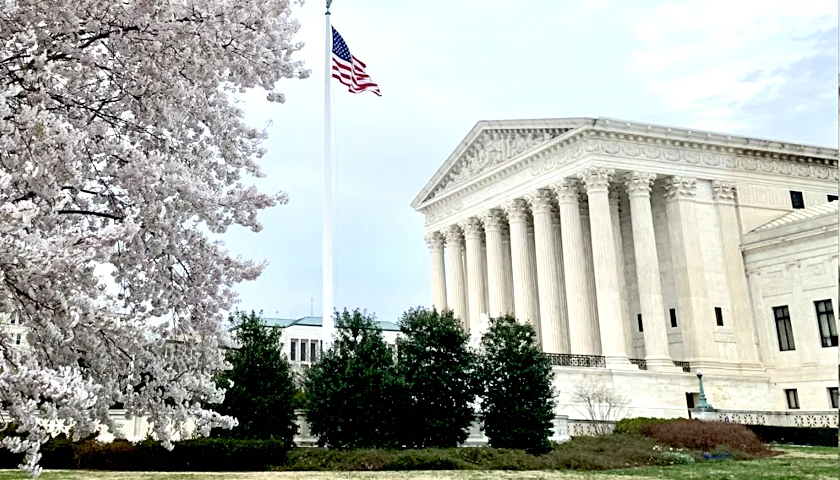The Pennsylvania House Judiciary Committee approved term limits Tuesday for the Philadelphia District Attorney as well as a bill allowing state prosecutors to pursue Philadelphia gun violations.
Both measures have the secondary effect of rebuking the performance of the city’s top prosecutor, Larry Krasner (D), under whose watch violence and crime have skyrocketed. In 2017, 315 murders occurred in Philadelphia and the number rose to an all-time high of 562 last year. Many attribute the increase in crime to Krasner’s tendency to release many defendants charged with illegal gun possession and violent offenses.
One of the bills passed on Tuesday would reinstate the “concurrent jurisdiction” the state Attorney General’s Office recently possessed regarding felony gun charges in the city. This allowed state attorneys to investigate and prosecute firearms charges that the district attorney would ordinarily handle.
In 2019, almost all state lawmakers voted to institute concurrent jurisdiction and Governor Tom Wolf (D) signed the original measure in July of that year. Yet during the two-year period for which the authority was granted, Attorney General Josh Shapiro (D) never utilized it. State Representatives Martina White (R-Philadelphia) and Craig Williams (R-Chadds Ford), sponsors of the renewal legislation, told the committee that Shapiro and his assistant attorneys should get another chance to shoulder some of Philadelphia’s gun caseload.
“Arrests and incidents relating to the unlawful trafficking and use of firearms in Philadelphia have increased significantly since our District Attorney Larry Krasner assumed office in 2017,” White said. “But despite this increase, prosecutions [for such offenses] have decreased. … Unfortunately, the attorney general did not utilize the [original] legislation, so we are looking for you to reauthorize it permanently to ensure that these types of crimes are addressed and that we have all hands on deck from our state government to help assist Philadelphia in addressing this crime wave that we are experiencing.”
Williams, himself a former federal prosecutor, noted that police last year arrested approximately 3,000 previously convicted felons who were discovered to possess firearms – a violation of both federal and commonwealth laws. Before last year, 63 of those arrested on such charges received convictions, yet last year only 49 percent did.
The representative recognized that some officials in and near Philadelphia have complained that they lacked the resources to adequately manage illegal firearm cases; thus lawmakers last year budgeted $1.5 million for Philadelphia and Delaware counties to hire more prosecutors for this purpose, an allocation Williams said he would seek again this year. Now, he said, the commonwealth should step in to prosecute some of the repeat gun offenders to lessen the current swell in violent crime.
“You deter gun crime by getting guns off the street from the hands of criminals,” he said. “You know who they are because we’ve convicted them already.”
All committee Republicans voted for the bill and all Democrats opposed it. Some Democrats noted the legislation has the opposition of both Krasner and Shapiro and questioned why lawmakers would seek its enactment when the latter hasn’t shown interest in using concurrent jurisdiction.
“I appreciate the context that this has existed for two years and the attorney general has not taken advantage of it,” State Rep. Emily Kinkead (D-Pittsburgh) told colleagues. “I believe that that’s two years of evidence that this is something that is not necessary.”
Williams responded that the U.S. Department of Justice has asked all agencies with jurisdiction to join the fight against gun violence in the City of Brotherly Love and that his legislation invites Shapiro’s office to finally do so, leaving him to ultimately explain why he won’t if he is unwilling.
“Whether or not he decides to pitch in is a decision for him to make and to explain to the commonwealth,” Williams said. (Shapiro’s explanation, should he make one, is likely to get heightened scrutiny insofar as he is currently campaigning to be Pennsylvania’s governor.)
White also sponsored the measure to limit the district attorneys of a first-class county to two terms. As only one such county exists in the Keystone State, the legislation would apply only in Philadelphia. White cited the city’s limit on mayoral service to two terms as an example of good-government assurance that such a powerful figure will not become entrenched and said such a provision should go into effect for district attorneys.
“It is important to keep elected officials accountable,” she said. “The only current mechanism to do so for a district attorney is through this legislative body through impeachment, which is a very difficult process. Term limits will give us another way to curtail unchecked authority executive-level officials have in critical positions of government.”
She further noted that many states, including Pennsylvania, have term limits for their attorneys general. Her measure passed with the support of nearly all committee Republicans – the one exception being Rep. Paul Schemel (R-Waynesboro) – and no Democrats, some of whom dismissed it as an attack on the current district attorney.
Krasner’s far-left bent used to be unusual for a big-city prosecutor, but his ideology attracted the support of progressive billionaire George Soros when Krasner first ran for district attorney in 2017. Soros contributed $1.7 million to Krasner’s campaign against six other Democrats that year and has backed many other lenient prosecutorial candidates across the U.S.
– – –
Bradley Vasoli is managing editor of The Pennsylvania Daily Star. Follow Brad on Twitter at @BVasoli. Email tips to [email protected].
Photo “Larry Krasner” by Larry Krasner.





